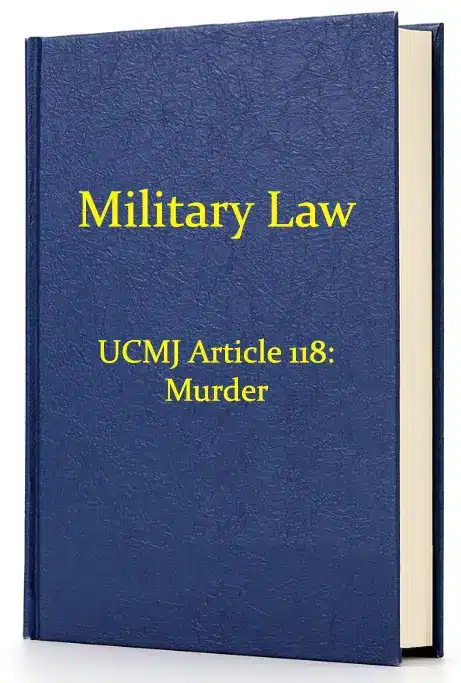The MCM states any service member is subject to prosecution under Article 118 (Murder) if, without justification or excuse, they unlawfully kill a human being by:
-
having a premeditated design to kill;
-
intending to kill or inflict great bodily harm;
-
engaging in an act that is inherently dangerous to another and evinces a wanton disregard for human life; or
-
engaging in the perpetration or attempted perpetration of burglary, rape, rape of a child, sexual assault, sexual assault of a child, aggravated sexual contact, sexual abuse of a child, robbery or aggravated arson.
To be prosecuted for premeditated murder, the prosecution must demonstrate that:
-
a particular named or described person is dead;
-
the death resulted from the act or omission of the accused;
-
the killing was unlawful; and
-
at the time of the killing, the accused had a premeditated design to kill.
The accused may be convicted of intent to kill or inflict great bodily harm if:
-
a particular named or described person is dead;
-
the death resulted from the act or omission of the accused;
-
the killing was unlawful; and
-
at the time of the killing, the accused had the intent to kill or inflict great bodily harm upon a person.
A conviction for an act inherently dangerous to another may result if:
-
a particular named or described person is dead;
-
the death resulted from the intentional act of the accused;
-
this act was inherently dangerous to another and showed a wanton disregard for human life;
-
the accused knew that death or great bodily harm was a probable consequence of the act and
-
the killing was unlawful.
The service member may be prosecuted for engaging in the perpetration or attempted perpetration of burglary, rape, rape of a child, sexual assault, sexual assault of a child, aggravated sexual contact, sexual abuse of a child, robbery, or aggravated arson if:
-
A particular named or described person is dead;
-
the death resulted from the act or omission of the accused;
-
the killing was unlawful; and
-
at the time of the killing, the accused was engaged in the perpetration or attempted perpetration of burglary, rape, rape of a child, sexual assault, sexual assault of a child, aggravated sexual contact, sexual abuse of a child, robbery, or aggravated arson.
Understanding Article 118 (Murder) of the UCMJ
The killing of a human being without justification is unlawful. The circumstances surrounding the event determine if the killing is deemed to be murder or a lesser offense. The offense is committed wherever the act or omission took place, even though the victim may have died at another location. Death does not need to have occurred immediately after the act or omission took place, but rather, death must have resulted from an injury received by the victim as a result of the act or omission.
Premeditated murder requires premeditation. This means that the taking of a life was consciously conceived and decided upon, and the act or omission was intentional. The length of time from the conception of the act or omission to the completion is irrelevant. Premeditation may be inferred from the circumstances surrounding the act or omission. If the accused had a deliberate design to attempt to kill a specific person unlawfully but by mistake killed a different person, they are still criminally responsible for premeditated murder because the design to kill is transferred from the intended victim to the actual victim. Voluntary intoxication that does not amount to legal insanity may reduce a charge of premeditated murder, but it will not reduce it to manslaughter.
An unlawful killing without premeditation was also murder when the accused had either an intent to kill or inflict great bodily harm. If the accused intentionally committed an act they knew would likely result in death or significant bodily injury. Intent may be inferred for the death or substantial physical injury that occurred. The intent does not need to have been directed toward the victim or exist for any particular time before the act occurred. The purpose of living at the time of the act or omission is sufficient. For this subheading, great bodily harm refers to fractured or dislocated bones, deep cuts, torn members of the body, severe damage to internal organs, and other serious physical injuries. It is synonymous with the term “grievous bodily harm.” Voluntary intoxication not amounting to legal insanity does not reduce unpremeditated murder to manslaughter or any other lesser offense.
An act inherently dangerous to others requires a demonstration of a wanton disregard for human life. This means the accused intentionally engaged in an act that was dangerous to others but did not intend for the act to result in death or great bodily harm to others, and the act showed a wanton disregard for human life. The disregard for human life is characterized by heedlessness of the probable consequences of the act or omission or indifference to the likelihood of death or great bodily harm. The knowledge that the act or omission would probably result in death or significant physical harm must also be evident, but such knowledge may be demonstrated through circumstantial evidence.
If the commission or attempted commission of a burglary, rape, rape of a child, sexual assault, sexual assault of a child, aggravated sexual contact, sexual abuse of a child, robbery, or aggravated arson results in homicide or if the unlawful killing is the consequence of the commission or attempted commission, the killing is deemed to be murder. The death being unintended or accidental is not a viable defense. The perpetration or attempted perpetration of burglary, rape, rape of a child, sexual assault, sexual assault of a child, aggravated sexual contact, sexual abuse of a child, robbery, or aggravated arson may also be charged separately from the homicide.
Maximum Possible Punishment for Violations of Article 118
Service members convicted of a violation of Article 118 face a maximum possible punishment of death. The mandatory minimum punishment is life imprisonment with an eligibility for parole.
How do you defend against Article 118 Murder charges?
When facing the combined resources of the military and the current cultural climate, you need to be prepared to defend your career and your freedom. Crisp and Associates, LLC has a team of experienced trial attorneys with over 75 years of combined experience who have won these cases. This team includes the firm’s founder, Jonathan Crisp, a highly respected and sought-after attorney, speaker, and lecturer who has served in the U.S. Army Judge Advocate General’s Corps (JAG) since 1998 and entered private practice in 2007.
If you, or someone you know, is facing Article 118 charges for Murder, you need to speak with a Military defense attorney right away. We understand what is at risk and learn how to protect your career, freedom, and future.


